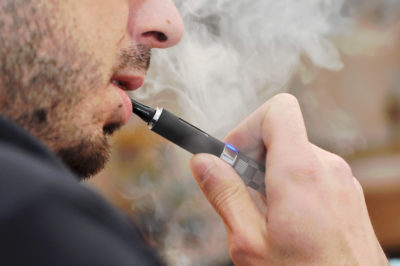An opponent to the flavored e-cigerette bans spoke out today about the differences, mistakes and misconceptions about vaping and public health.
Vicki Vasconcellos is the president of the Smoke Free Alternatives Coalition of Illinois, who says the vape industry in Illinois has been working for over three years to pass regulatory framework that addresses the issue of marketing and sales to youth in Illinois and said that the industry has been met with resistance at the state level.
“I think that is a different issue though, than these tainted THC carts, which is a very serious issue. Unfortunately, I think because of a misunderstanding of terms,
e-cigarettes, and THC carts, and vape pens, are different things. So when you tell the public that illnesses are coming from e-cigarettes, people that are using THC carts do not think that applies to them. It is not a distinct enough warning, and a majority of the public is still unaware that they should avoid THC carts that are illicit market.”
Vasconcellos said that oil in THC cartridges, or carts, as they are called, are what is posing the biggest health threat from vaping.
“It was known early on that a new additive had come to market and it contained vitamin E acetate, which is an oil that is being found in these carts that the F.D.A. is investigating and testing. It should obviously not be inhaled. There are not oils in electronic cigarettes and e-liquid, you could not put oil in an electronic cigarette atomizer and it work, it is too heavy. We have a water or alcohol based liquid, it is a much lighter liquid. They are very different products.”
Vasconcellos said that one of the biggest issues that needs to be addressed is an understanding of different types of vape products, and which are those that are causing the lung issues, especially in young people. She said than banning all flavored products is not going to solve the issue.
“Banning flavors would be throwing the baby out with the bathwater so to speak, you are going to harm public health. Kids are not getting these from vape shops for the most part, they are getting it from social sources. Illinois just enacted Tobacco 21 on July 1st and we have yet to see the impact from that legislation. And secondarily with regard to the lung disease, we need to really make sure that people are reporting the correct products. The public is not aware it is THC carts, they think it is e-cigs, it’s not.
The C.D.C. has been modifying what they are saying because they have come under a great deal of ridicule by labeling them e-cigs, and their misuse of terms is not accurate and not giving a warning to the public. The F.D.A. has said, do not buy black market THC products, and that is what has to be driven home.
If you vape, the C.D.C. has said if you are an e-cigarette user that are using these to not smoke- do not go back to cigarettes. I think the headlines need to start reflecting current data and let the public know what to avoid on the market because there was one death when we started yelling at the C.D.C. because they were using the wrong term, and now, the last time I checked, there are eight.”
Vasconcellos said that over 13 million people use vape products instead of smoking cigarettes and that according to research, vaping is the most successful form of smoking cessation products for adults today.
Vasconcellos said that youth vaping is a problem the industry wants to see controlled and there are common sense ways to do that, without removing the alternative to smoking traditional cigarettes, that supporters say are 95% less harmful than tobacco.




